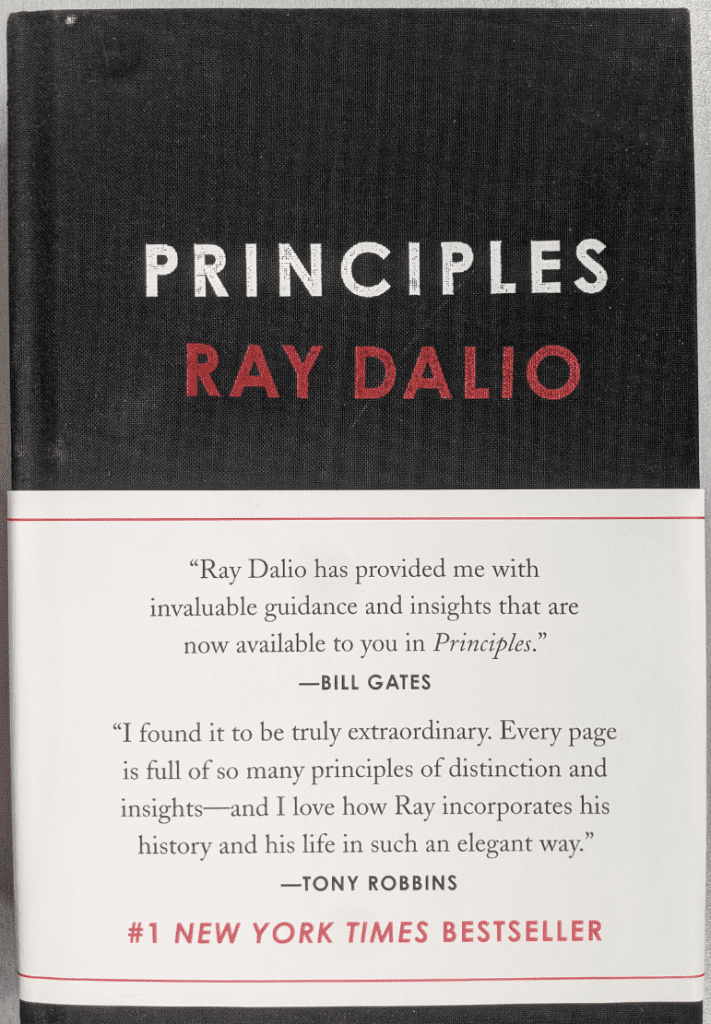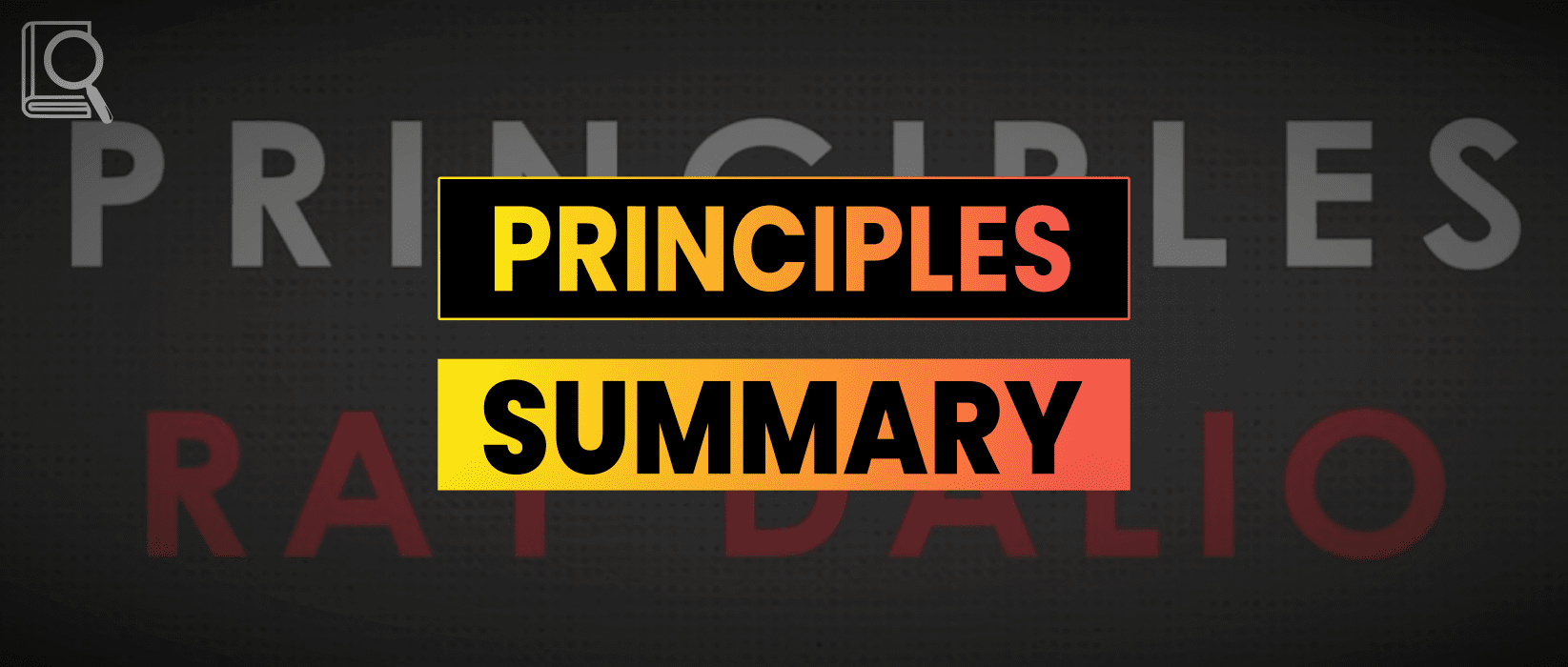Ray Dalio’s Principles is a hybrid manifesto, part memoir and part management guide, built on a foundational thesis: success whether in life or business is the result of identifying and consistently applying a set of fundamental principles. Dalio, founder of Bridgewater Associates, one of the world’s largest and most successful hedge funds, distills decades of hard won insights into a rigorous framework for decision making, problem solving, and organizational governance.
At its core, the book argues that effective living and leading require radical transparency, radical truth, and a meritocratic system grounded in idea meritocracy. Dalio proposes that principles defined as fundamental truths that serve as the foundations for behavior can and should be systematized to enhance clarity, productivity, and coherence in complex, high stakes environments.

Dalio’s reputation as a disciplined thinker is well earned. Bridgewater’s meteoric rise, along with its distinctive organizational culture of extreme candour and algorithmic decision making, provides empirical support for the methods described. Readers benefit from a unique convergence of philosophical reflection, real world experimentation, and pragmatic execution strategies.
1. Principles as Decision Making Algorithms
Dalio begins by defining principles as fundamental truths that guide behavior and lead to desired outcomes. These are not static commandments but adaptable algorithms mental models for navigating complexity. By codifying these principles, individuals can make better, faster, and more consistent decisions.
He likens this process to building a machine: principles serve as the operating system, enabling users to automate repetitive decisions and refine responses to new challenges. The idea is not just to act, but to “reflect, systematize, and evolve” actions based on recurring patterns.
2. Radical Truth and Radical Transparency
One of the most defining aspects of Dalio’s worldview is his commitment to radical truth (facing reality, even when uncomfortable) and radical transparency (openness in thoughts, mistakes, and processes). These values underpin the culture at Bridgewater, where meetings are recorded, feedback is expected in real time, and even the CEO is publicly challenged.
Dalio argues that embracing discomfort is essential for growth. By minimizing ego and emotional distortion, radical transparency fosters an environment where the best ideas regardless of hierarchy win. This is a precondition for idea meritocracy.
3. Idea Meritocracy and Believability Weighted Decision Making
An idea meritocracy is an environment where decisions are made based on the merit of ideas, not the power dynamics of positions. Central to this concept is the practice of believability weighted decision making. Rather than one person one vote, decisions are weighted according to the past track record, domain expertise, and quality of reasoning of each contributor.
Bridgewater operationalizes this through tools like “dot collectors,” which aggregate and display real time feedback on people’s thinking. This creates a constantly evolving map of each person’s strengths and weaknesses, allowing teams to factor in credibility rather than rely on status or charisma.
4. Five Step Process for Achieving Goals
Dalio introduces a meta framework for life improvement: the Five Step Process. This recursive loop is designed for continuous personal and organizational evolution:
- Set clear goals.
- Identify problems that stand in the way.
- Accurately diagnose the problems to get at their root causes.
- Design plans that will get you around those problems.
- Execute those plans relentlessly.
Each step is dependent on the quality of the previous one. The key is honest diagnosis often hindered by ego or fear. Dalio emphasizes that most people fail not because they don’t want to succeed, but because they are unwilling to confront painful truths or abandon dysfunctional habits.
5. Pain + Reflection = Progress
Pain, in Dalio’s formulation, is an essential signal. Rather than avoid discomfort, individuals should embrace it as a cue for learning. Reflection transforms pain into progress by forcing analysis and insight. This equation encapsulates the broader Stoic and evolutionary ethos of the book: suffering is a tool for growth.
Bridgewater institutionalizes this with “pain buttons”-a literal system where employees track emotional pain to identify blind spots and trigger reflection. While extreme, the concept reflects Dalio’s deep belief in psychological adaptability as a function of principled learning.
6. Personal Evolution and the Use of Algorithms
Dalio believes that humans can and should evolve over time by “writing down” what works, refining it, and using it in future decisions. This leads to the development of algorithms automated decision making tools derived from experience and principle based logic.
In the Bridgewater context, many management functions are encoded into software. Dalio suggests this approach is equally applicable to individual lives: articulate your principles, test them, and refine them based on empirical feedback. Over time, your personal algorithm becomes more accurate and efficient.
7. Understanding People Through Personality Typologies
Another critical framework is the use of personality assessments to build teams and assign tasks. Dalio references tools like the Myers Briggs Type Indicator, DISC assessments, and his own in house psychometric analytics.
The premise is that individuals are “wired” differently, and that successful collaboration depends on understanding and leveraging those differences. Leaders should seek complementary traits, not just competence. Emotional reactions, communication styles, and cognitive preferences all affect how principles are applied in practice.
8. Organizational Design: Culture as Operating System
Dalio views an organization as a machine made up of distinct parts: goals, people, and systems. A key insight is that culture is not an intangible spirit but a consciously designed operating system. When culture, structure, and principles align, organizations can scale efficiently without losing integrity.
He advocates for creating “shapers”-visionary individuals who combine creativity, determination, and open mindedness to lead these systems. A company’s success depends not just on what it does, but how repeatable and scalable its decisions are. This is why principle based decision making is essential.
Takeaways
- Codify your own principles. Identify the values and truths that consistently lead to your desired outcomes. Write them down, refine them, and refer to them regularly when making decisions.
- Implement the Five Step Process rigorously. Always start with clear goals. Diagnose problems at the root level, design tactical plans, and execute without compromise.
- Practice radical truth and transparency. Be brutally honest with yourself and others. Eliminate politics, gossip, and behind the scenes maneuvering. The best ideas should always win.
- Adopt believability weighted decision making. Don’t treat all opinions equally. Evaluate credibility based on track record, logic, and domain expertise before making a decision.
- Use pain as a diagnostic tool. Don’t avoid emotional discomfort track it, reflect on it, and use it to improve your understanding of yourself and the situation.
- Build and refine personal algorithms. Treat your life like a system. Once you find what works, automate it. Continually iterate and update your principles based on experience.
- Assess personality fit in teams. Use psychological tools to understand team members’ strengths and weaknesses. Match people to roles based on wiring, not just skills.
- Design culture consciously. Whether for a family or a business, establish norms and principles that create the behaviors and results you want. Treat your culture as an active component of your operating system.
- Fail well. Dalio emphasizes that failure is not the opposite of success but a component of it. Embrace mistakes as data, not as verdicts. Post mortems are as important as strategic plans.
- Don’t conflate what feels good with what is good. The most beneficial decisions often come with discomfort. Long term success depends on overriding short term emotional impulses.
- Evolve or die. Whether you’re an individual or a company, stagnation is the enemy. Continuous learning, feedback loops, and principled adaptation are non negotiables for long term survival.
- Use tools and technology to scale principles. Bridgewater’s example shows how decision principles can be embedded in software and processes. Consider how to translate your insights into systems others can use.
- Understand that life is a game of probabilities. There’s no way to guarantee outcomes, but principle based thinking improves your odds. Approach life as a probabilistic system, not a deterministic one.
Principles Life and Work is a definitive guide to building a principle driven life and organization. Drawing from decades of empirical experimentation in high stakes finance, Ray Dalio offers not just theory but tested frameworks for achieving clarity, performance, and integrity. His message is as much about personal development as it is about systems design: to thrive in a complex world, one must codify truth, embrace discomfort, and build processes that allow the best ideas to win. Whether you’re leading a company or navigating personal decisions, Dalio’s principles offer a replicable blueprint for meaningful success.
https://www.amazon.co.uk/Principles-Life-and-Work/dp/B074B28CXV



